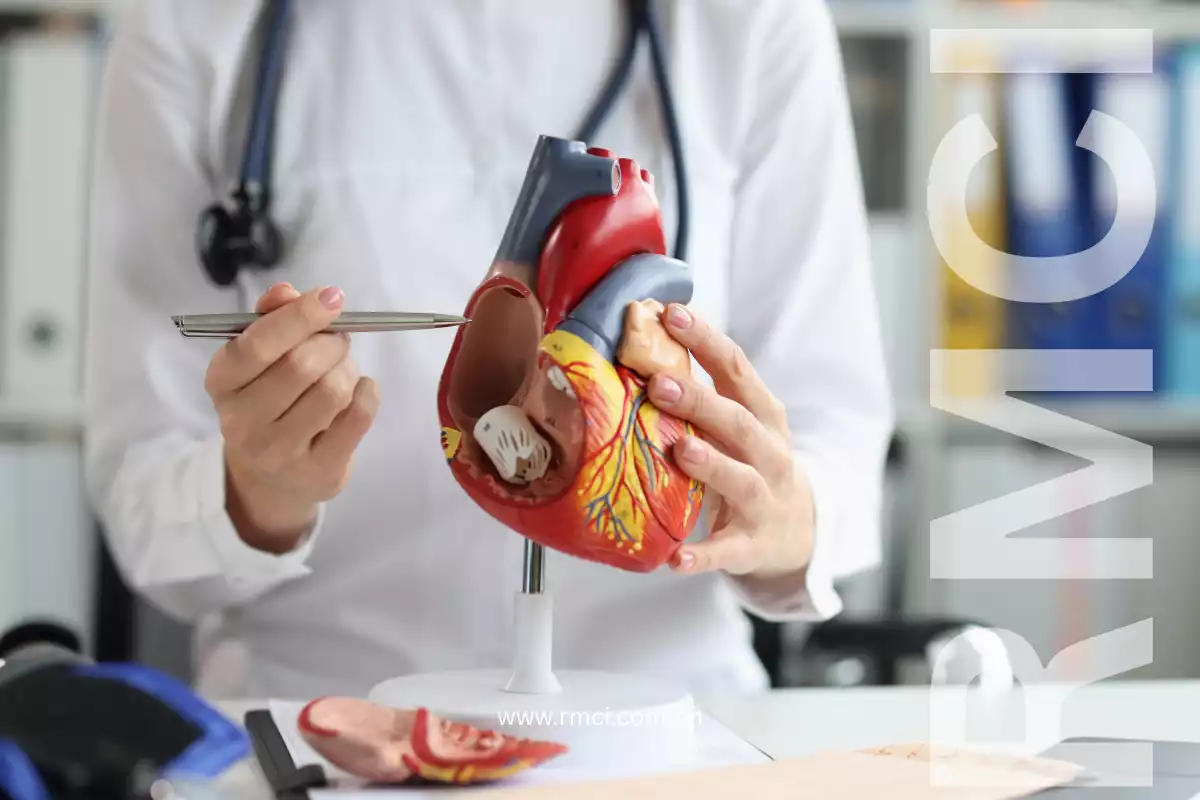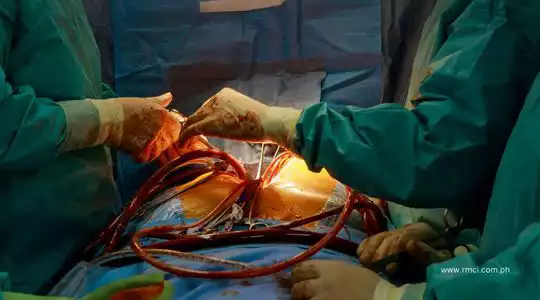Need a cardiologist in Panabo City?
If you’re looking for a cardiologist in Panabo City, Davao del Norte, here are cardiologists who can help you with your cardiovascular health.
Understanding Cardiologists and Their Role
A cardiologist is a medical doctor specialized in diagnosing, treating, and preventing diseases of the heart and blood vessels, collectively known as the cardiovascular system. These medical experts manage conditions ranging from heart attacks, hypertension, and heart failure to abnormal heart rhythms and congenital heart defects.
Cardiologists at Rivera Medical Center, Inc. (RMCI) use various diagnostic tools such as electrocardiograms (EKG), echocardiograms, stress tests, and cardiac catheterization to accurately assess and monitor heart health.
Treatment approaches used by cardiologist may include prescribing medication, recommending lifestyle changes, and performing specialized procedures like pacemaker implantation, heart valve repair, and coronary angioplasty.
Cardiologists are critical for maintaining heart health, especially in Panabo City, Davao del Norte, where cardiovascular diseases remain a major health concern.
Rivera Heart & Metabolism Center of Excellence
Rivera Heart & Metabolism Center of Excellence is RMCI’s department for cardiometabolic health for patients in Davao del Norte. Below are some key services they provide:
Cardiologist in Panabo City, Davao del Norte: Services
ECG (Electrocardiogram)
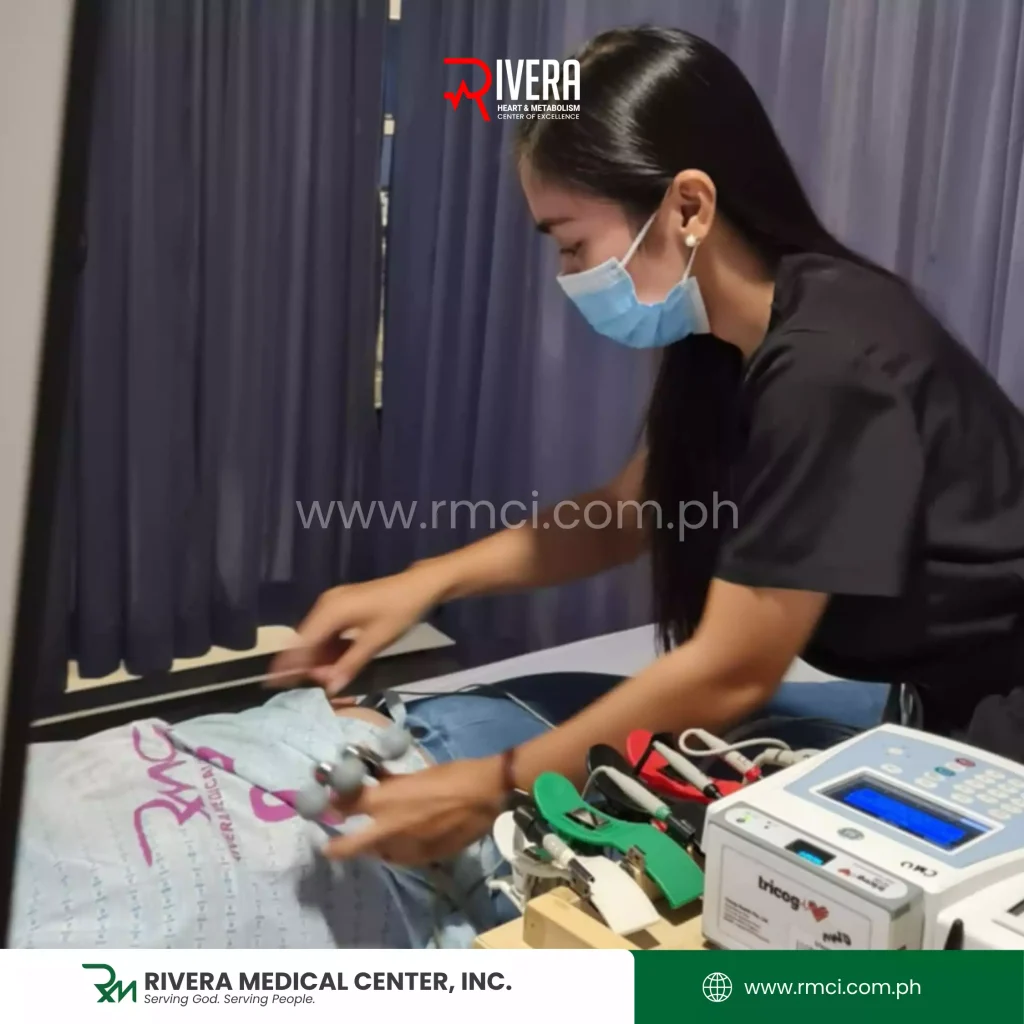
An Electrocardiogram (ECG or EKG) is a quick, non-invasive test that records the electrical activity of the heart. It helps identify heart rhythm problems, detect previous heart attacks, or monitor ongoing heart conditions, such as:
- Heart rhythm problems (arrhythmias like atrial fibrillation)
- Heart attacks (past or current)
- Poor blood flow to the heart (ischemia)
- Structural problems (e.g., enlarged heart chambers)
- Electrolyte imbalances
- Effects of heart medications or devices (like pacemakers)
Resting 2D Echocardiogram (for Adult)
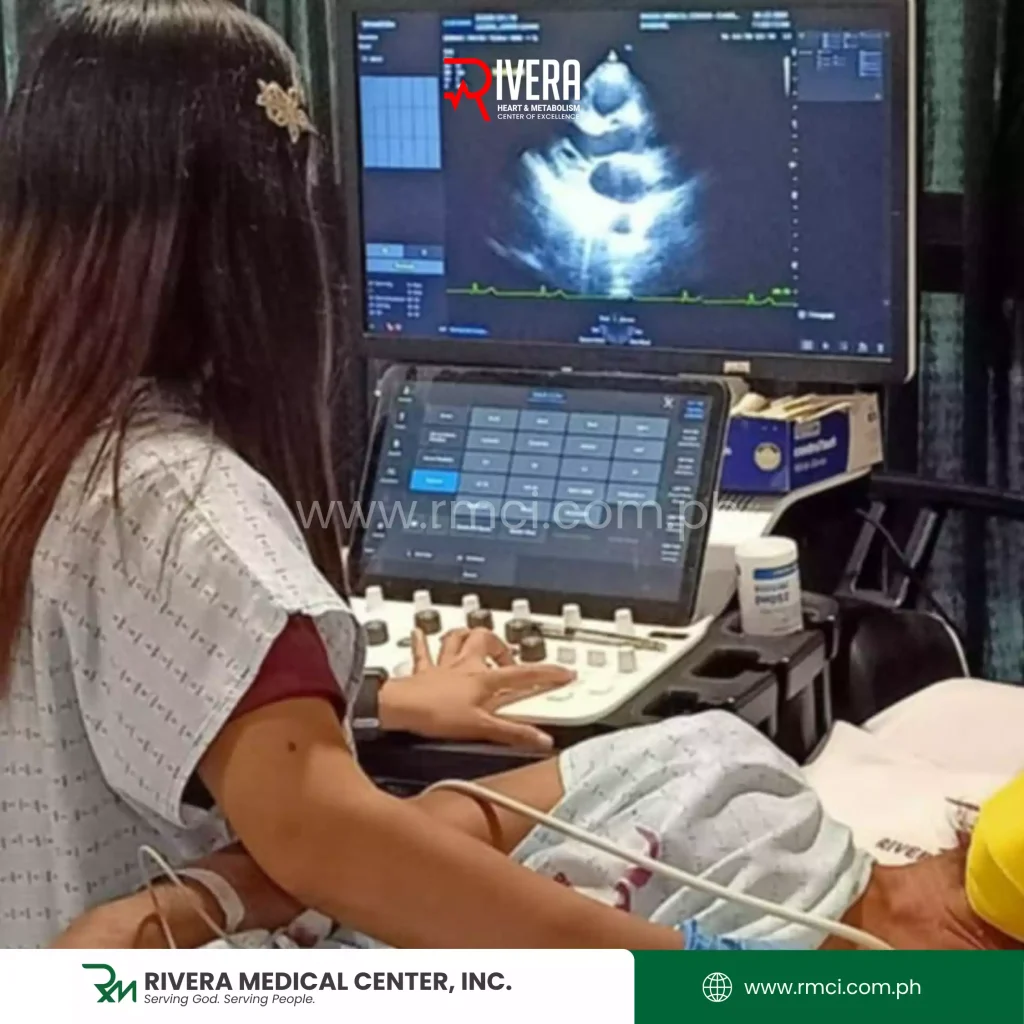
A 2D echocardiogram, or “echo,” is a non-invasive ultrasound test that uses high-frequency sound waves to create live images of your heart while you are at rest. It helps your doctor assess the size, structure, and function of your heart and its valves. doctor assess the size, structure, and function of your heart and its valves.
- Evaluate heart size and function
- Assess heart valve structure and leaks (regurgitation) or narrowing (stenosis)
- Detect wall motion abnormalities (could signal past or silent heart attacks)
- Measure ejection fraction (EF) – how well the heart pumps
- Check for congenital heart defects, pericardial effusion, or cardiomyopathy.
Stress Echocardiogram
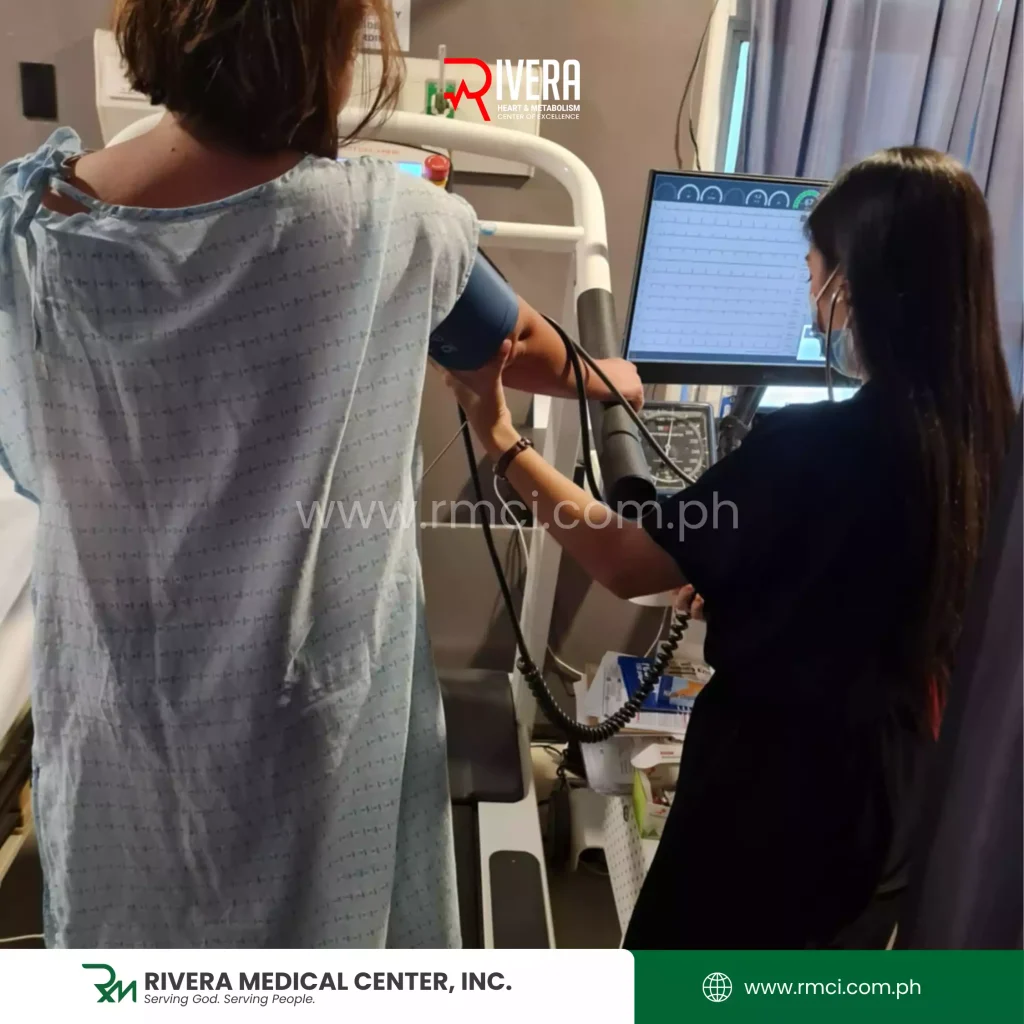
A Stress Echocardiogram is a test that combines an exercise stress test with echocardiography (heart ultrasound). It shows how well your heart functions when it is working harder, typically during exercise (like walking on a treadmill or cycling).
- Detect coronary artery disease (CAD) — narrowed or blocked arteries
- Evaluate chest pain, shortness of breath, or exercise intolerance
- Assess your exercise capacity and heart response to stress
- Monitor known heart conditions
- Check for wall motion abnormalities during stress
Dobutamine Stress Echocardiogram
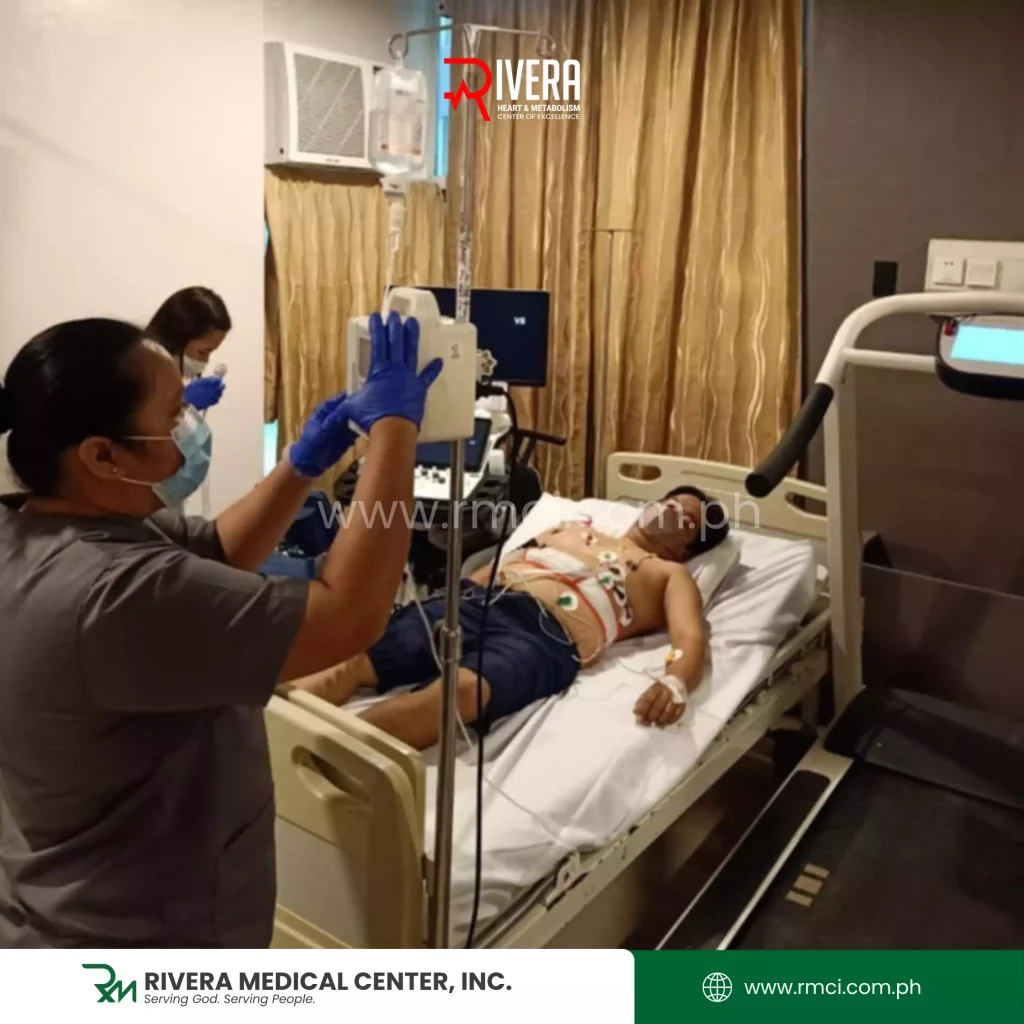
A Dobutamine Stress Echocardiogram is a special type of heart ultrasound that evaluates how well your heart functions under stress.
Instead of exercise, a medication called dobutamine is used to make your heart beat faster and harder—mimicking the effects of physical activity. This test is helpful for patients who cannot perform treadmill or bicycle exercise due to physical limitations or medical conditions.
Bubble Echocardiogram
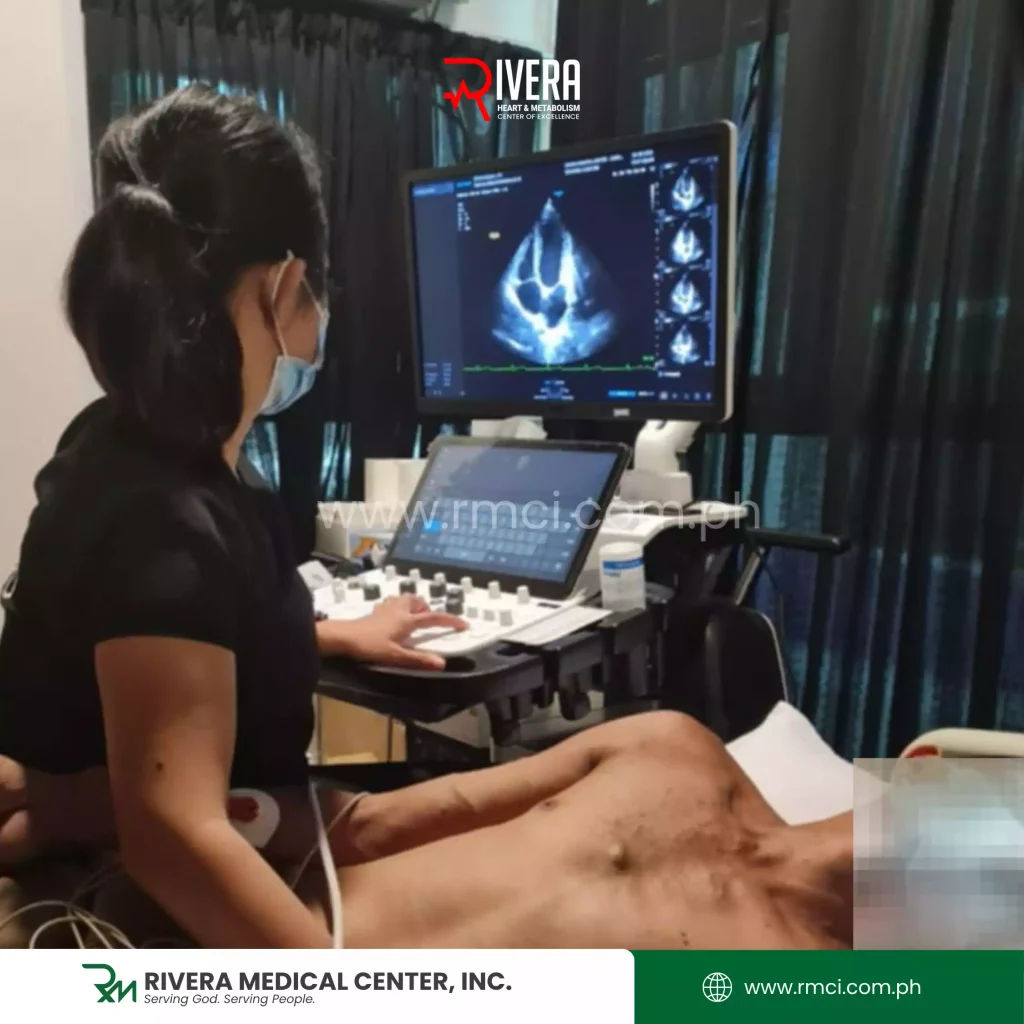
A Bubble Echocardiogram (also called contrast echocardiography) is a specialized ultrasound of the heart that uses microbubble contrast—tiny air bubbles injected into a vein—to help detect abnormal connections in the heart or lungs, especially a patent foramen ovale (PFO) or atrial septal defect (ASD).
- Detect a PFO or ASD (holes between heart chambers)
- Investigate cryptogenic stroke (stroke with no clear cause)
- Evaluate right-to-left shunting (when blood bypasses the lungs)
- Rule out pulmonary arteriovenous malformations (AVMs)
Ambulatory Blood Pressure Monitoring (ABPM)
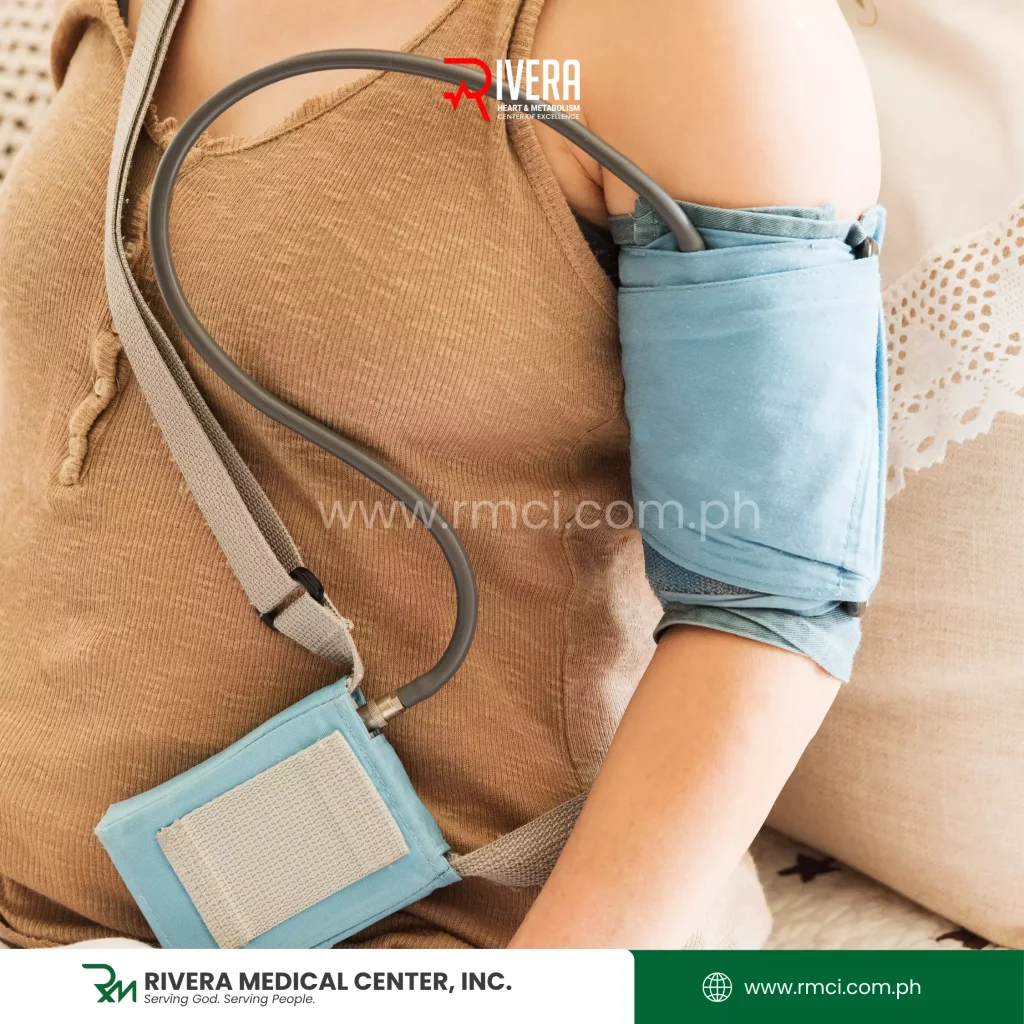
Ambulatory Blood Pressure Monitoring (ABPM) is a diagnostic test used to measure your blood pressure continuously over a 24-hour period while you go about your normal daily activities and sleep. It helps your doctor get a clearer picture of how your blood pressure behaves throughout the day and night. This helps:
- Confirm or rule out hypertension (especially white-coat hypertension).
- Evaluate the effectiveness of BP medications.
- Detect masked hypertension (normal in-clinic, high outside).
- Monitor nocturnal blood pressure patterns (which can relate to heart and kidney risks).
- Investigate symptoms like dizziness, headaches, or palpitations.
Carotid Doppler Ultrasound
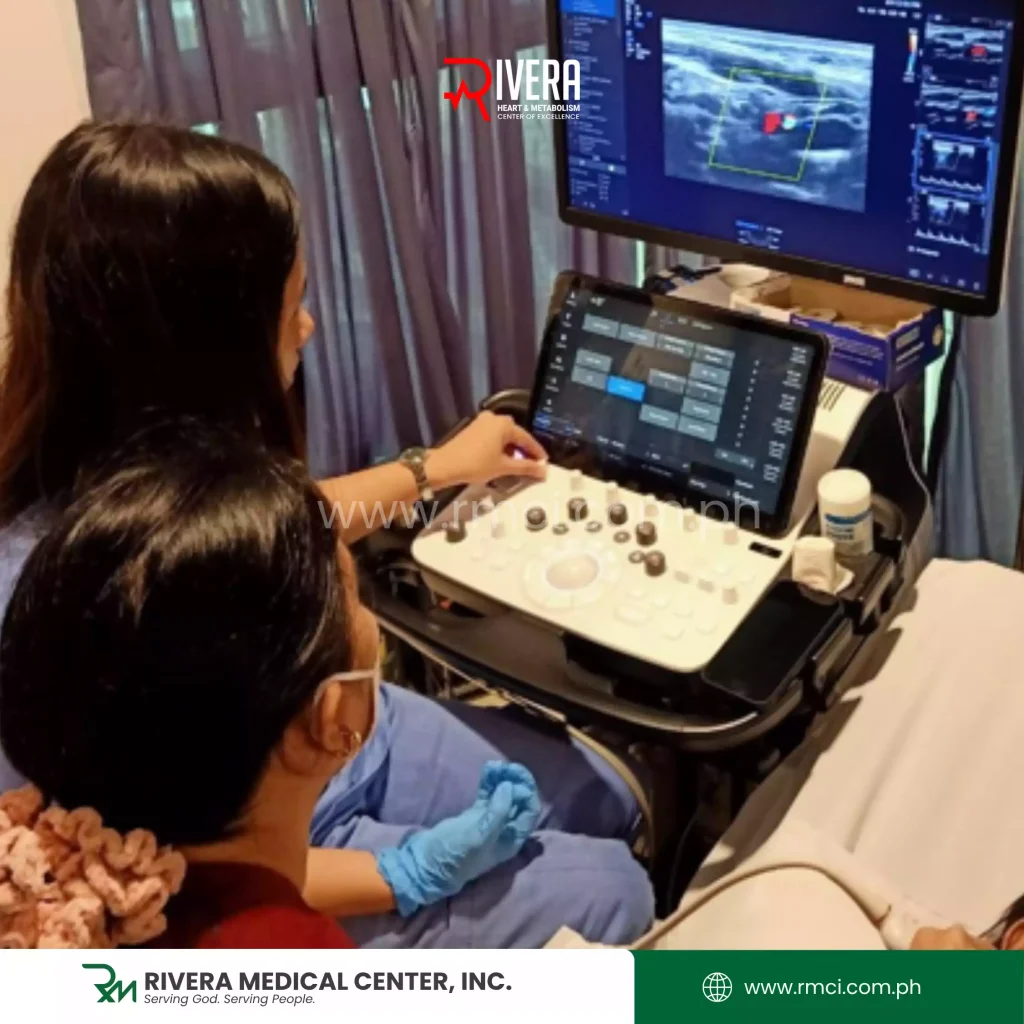
A Carotid Doppler Ultrasound (Bilateral) is a non-invasive imaging test that uses sound waves to assess the carotid arteries in your neck—both left and right sides. These arteries supply blood to your brain, and the test helps evaluate blood flow and detect potential blockages or narrowing (known as carotid artery stenosis).
- Symptoms of stroke or TIA (e.g. sudden weakness, vision changes, slurred speech)
- A carotid bruit (abnormal sound in neck artery heard with stethoscope)
- Risk factors for atherosclerosis: High blood pressure, High cholesterol, Diabetes, Smoking history, Family history of stroke or heart disease
- Monitoring after carotid surgery or stenting
Venous Duplex Ultrasound
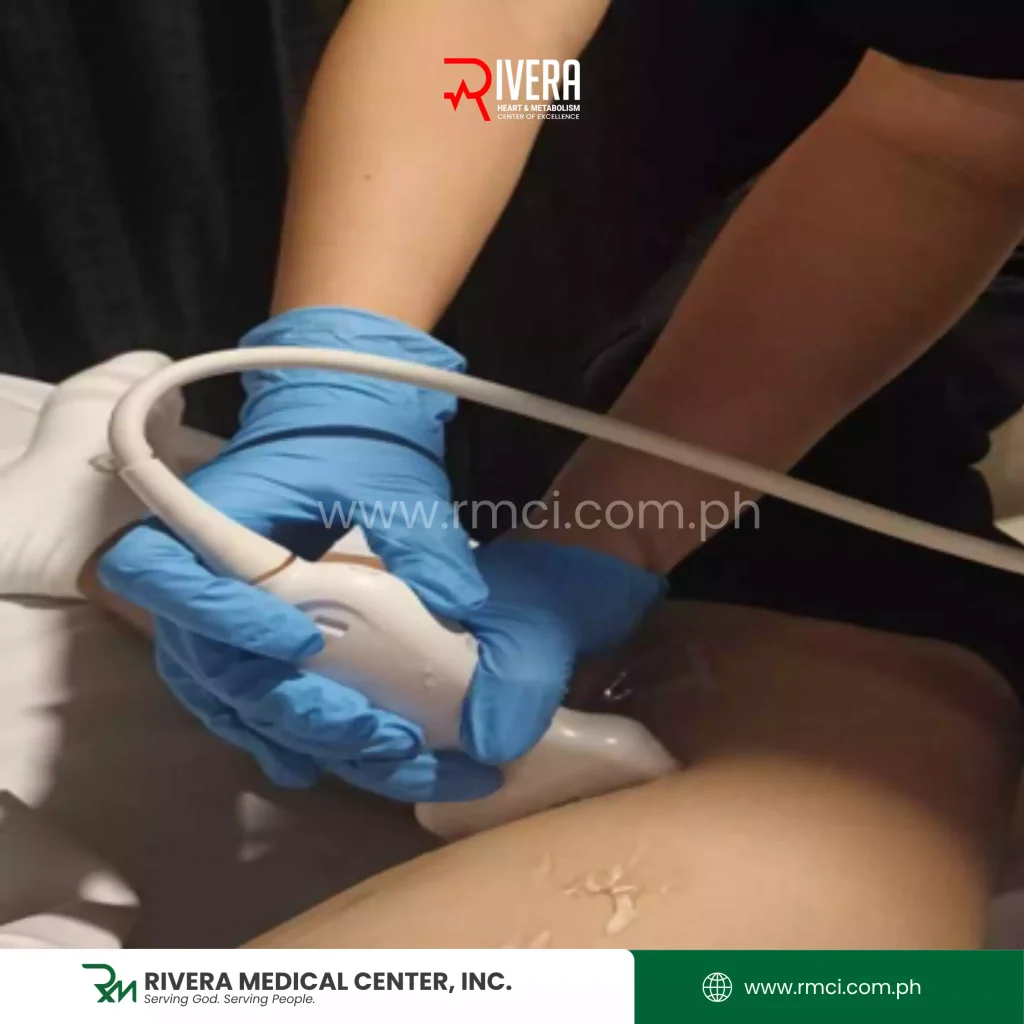
A Venous Duplex Ultrasound is a non-invasive test that uses ultrasound imaging and Doppler technology to examine the veins in your body—usually in your legs or arms—to assess blood flow, valve function, and check for blood clots or venous insufficiency.
- Check for deep vein thrombosis (DVT) (a potentially dangerous blood clot)
- Evaluate varicose veins or chronic venous insufficiency
- Investigate leg swelling, pain, or skin discoloration
- Monitor vein bypass grafts
Arterial Duplex Ultrasound

An Arterial Duplex Ultrasound is a non-invasive imaging test that combines traditional ultrasound and Doppler ultrasound to evaluate the arteries—usually in your arms or legs—on both the left and right sides. It helps detect narrowing, blockages, or other abnormalities in blood flow due to conditions like peripheral artery disease (PAD).
- Evaluate leg or arm pain (especially during walking)
- Screen for peripheral artery disease (PAD)
- Monitor blood flow after vascular surgery or stent
- Investigate non-healing wounds or ulcers
- Detect aneurysms, stenosis, or occlusion
Holter Monitoring (24-hour ECG)
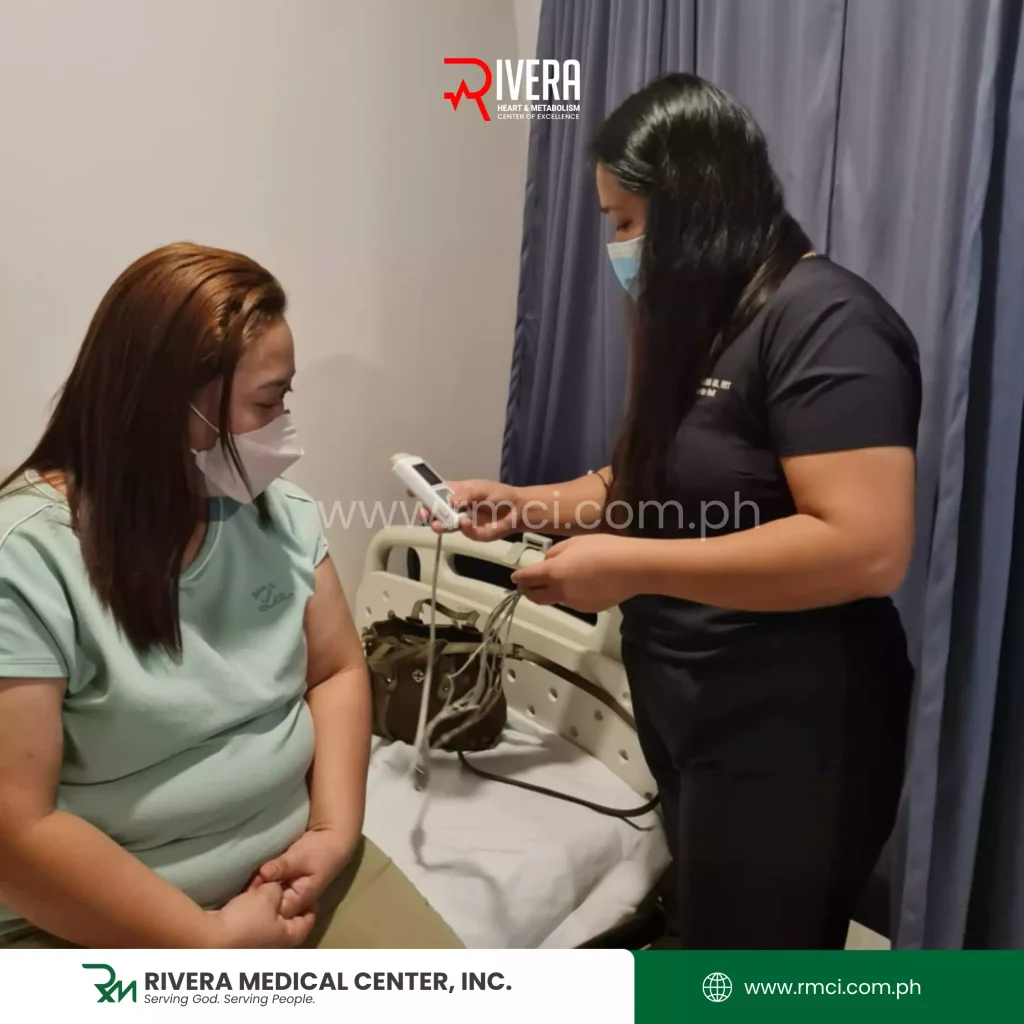
Holter Monitoring is a non-invasive, portable test that continuously records your heart’s electrical activity for 24 to 48 hours using a small, wearable device. It helps detect intermittent or irregular heart rhythms that may not show up during a standard ECG.
- Arrhythmias (irregular heartbeats)
- Bradycardia (slow heart rate) or Tachycardia (fast heart rate)
- Palpitations
- Skipped beats
- Dizziness or fainting (syncope)
- Chest pain not explained by a single ECG
- Effectiveness of heart medications or pacemakers
Role of the cardiologist in Panabo City, Davao del Norte
Addressing Heart Disease Prevalence and its Impact
Cardiovascular diseases, particularly ischemic heart disease, are a leading cause of death in Davao del Norte, and in the Philippines as a whole. In 2025, ischemic heart diseases topped the mortality causes in the Philippines, especially among young people. This health problem means there is urgent need for effective heart care and disease prevention programs.
Available data also reveal that Panabo City record one the highest numbers of deaths among the municipalities in the province, with Tagum City having the largest share of these incidents.
Cardiologist in Panabo City for cardiovascular health
To address the cardiovascular health challenges in these areas, several healthcare institutions provide specialized services. Rivera Medical Center (RMCI), located in Panabo City, has a specialized department for cardiovascular health. It features a specialized Rivera Heart & Metabolism Center focused on non-invasive diagnostics, diabetes management, and cardiovascular care.
RMCI emphasizes preventive care and offers subspecialty clinics for in-depth treatment, serving as a vital resource for patients who need a cardiologist in Panabo City, and surrounding parts of Davao del Norte. RMCI also caters to patients from barangays in Davao City, such as Tibungco, Panacan, and Sasa.
Heart disease prevention and Community Wellness
Communities in Panabo City have demonstrated strong engagement in cardiovascular health. Local governments have programs to help the elderly maintain high levels of active aging supported by local services focusing on emotional, physical, social, and cognitive wellness.
In Panabo City, for example, one of the most popular attractions is its City Hall & Freedom Park. This place provides residents with a modern government complex adjacent to a green parks where people can visit for relaxation, weekend markets, and weekend events.
A newly opened Mangrove Park in Panabo City is also part of the city’s efforts to strengthen community wellness. This mangrove park not only provides coastal protection, livelihood, and a natural habitat for birds, and marine and animal life. It also also promotes healthy living conditions for individuals and families in Panabo City.
Parks in Panabo City demonstrate community efforts contribute significantly to cardiovascular health by promoting lifestyles and social support systems for better cardiovascular health.
The Role of a Cardiologist in Panabo City and elsewhere
Cardiologists in Panabo City, Davao del Norte also lead educational initiatives on heart-healthy habits, risk factor management, and early detection of potential cardiovascular issues. They collaborate with primary care doctors to offer personalized lifestyle coaching and tailor treatments to individual needs, especially for patients managing comorbidities such as diabetes and high blood pressure.
Cardiologists in Panabo City, such as Dr. Ramon Miguel M. Rivera, who leads the Rivera Heart and Metabolism Center of Excellence, along with Dr. Myrrene Blue D. Cabrera, Dr. Aida P. Maranian, Dr. Anne Bernadette B. Arangcon, and Dr. Annie Loraine Estroppe-Khan, represent the dedicated efforts of medical professionals working to improve cardiovascular outcomes in Davao del Norte and nearby provinces in Mindanao.
Conclusion
For residents of Panabo City, Davao del Norte, cardiologists perform a central role in improving cardiovascular health. Cardiologists are highly trained specialists dedicated to protecting and improving heart health through advanced diagnostics, treatment, and preventive care.
With heart disease leading the cause of death in Panabo City, access to quality cardiology services and community wellness programs is important. If you need a cardiologist in Panabo City, check if their clinic or hospital is driven by integrity and excellence. Exemplary cardiologists would do a vital role in reducing the impact of cardiovascular diseases and enhancing the quality of life for the residents.
If you are concerned about your heart health or risk factors, consult with our cardiologists at Rivera Medical Center so they can provide expert guidance tailored to your needs. Call 09257076172.

